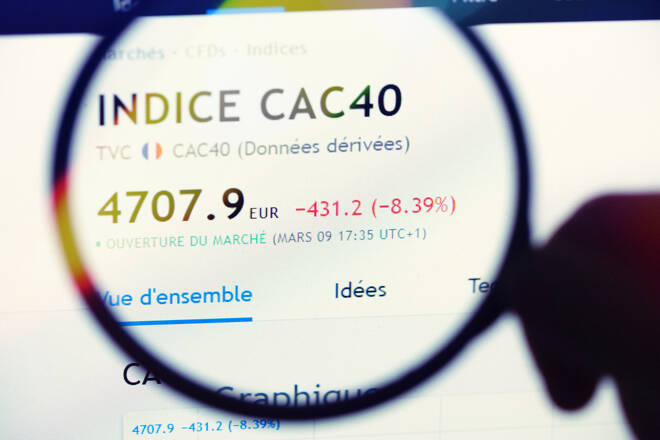Advertisement
Advertisement
European Equities: Eurozone GDP and Member State Inflation in Focus
By:
Following Friday's sell-off, disappointing private sector PMI numbers from China could test support ahead of key stats from the Eurozone.
Economic Calendar
Monday, 31st January
Spanish HICP (YoY) (Jan) Prelim
Spanish CPI (YoY) (Jan) Prelim
Eurozone GDP (QoQ) (Q4)
Eurozone GDP (YoY) (Q4)
German CPI (MoM) (Jan) Prelim
Tuesday, 1st February
German Retail Sales (MoM) (Dec)
French CPI m/m (Jan) Prelim
French HICP m/m (Jan) Prelim
Spanish Manufacturing PMI (Jan)
Italian Manufacturing PMI (Jan)
French Manufacturing PMI (Jan) Final
German Manufacturing PMI (Jan) Final
German Unemployment Change (Jan)
German Unemployment Rate (Jan)
Eurozone Manufacturing PMI (Jan) Final
Eurozone Unemployment Rate (Dec)
Wednesday, 2nd February
Italian CPI (MoM) (Jan) Prelim
Eurozone CPI (YoY) (Jan) Prelim
Eurozone Core CPI (YoY) (Jan) Prelim
Thursday, 3rd February
Spanish Services PMI (Jan)
Italian Services PMI (Jan)
French Services PMI (Jan) Final
German Services PMI (Jan) Final
Eurozone Markit Composite PMI (Jan) Final
Eurozone Services PMI (Jan) Final
Eurozone Retail Sales (MoM) (Dec)
ECB Interest Rate Decision / Press Conference
Friday, 4th February
German Factory Orders (MoM) (Dec)
French Non-Farm Payrolls (QoQ) (Q4)
German IHS Markit Construction PMI (Jan)
Eurozone Retail Sales (MoM) (Dec)
The Majors
It was a bearish end to the week for the European majors on Friday. The CAC40 fell by 0.82%, with the DAX and the EuroStoxx600 ending the day down by 1.32% and by 1.02% respectively. The losses came in spite of a bounce back across the U.S equity markets on Friday.
Disappointing GDP numbers from Germany and economic data from the U.S weighed on the majors. Market angst over the prospects of an imminent move by the FED also weighed, with U.S inflationary pressures picking up further in December. Autos continued to lose ground, with the sector taking a hit as the markets considered the impact of inflation on spending and the economic outlook.
The Stats
Member state GDP numbers for the 4th quarter were in focus early in the European open.
The French Economy
In the 4th quarter, the economy expanded by 0.7% following a 3.1% expansion in the previous quarter. Economists had forecast 0.5% growth.
According to Insee.Fr,
- Final domestic demand (excl. inventories) contributed 0.5 points, supported by both household consumption expenditure (+0.4%) and gross fixed capital formation (+0.5%).
- Trade terms weighed, however, with imports up 3.6%, while exports rose by 3.2%, resulting in a negative contribution to GDP (-0.2 points).
- The contribution of inventory changes to GDP growth was positive (0.4 points).
The German Economy
According to Destatis, the German economy contracted by 0.7% in the 4th quarter, after having expanded by 0.7% in the previous quarter. Economists had forecast a 0.3% contraction. Year-on-year, the economy grew by 1.4%, falling short of a forecast of 1.8%. In the 3rd quarter, the economy had also expanded by 1.4% year-on-year.
Other stats
French consumer spending and Spanish GDP numbers had a muted impact on the majors.
In December, French consumer spending increased by just 0.2%, which was in line with forecasts. Spending had risen by 0.9% in November.
For the 4th quarter, Spain’s economy expanded by 2.00% quarter-on-quarter, easing from 2.6% growth in the previous quarter. Economists had forecast 1.4% growth.
From the U.S
Inflation and personal spending figures were market negative.
In December, the Core PCE Price Index rose by 5.8% year-on-year, which was up from 5.7% in the month prior. Personal spending disappointed, however, falling by 0.6%. In November, personal spending had risen by 0.4%.
The Market Movers
For the DAX: It was a bearish day for the auto sector on Friday. Continental led the way, sliding by 2.65%, with BMW and Daimler ending the day down by 1.70% and by 1.80% respectively. Volkswagen fell by a more modest 1.43%.
It was also a bearish day for the banks. Deutsche Bank slipped by 0.07%, with Commerzbank declining by 1.67%.
From the CAC, it was a bearish day for the banks. BNP Paribas slid by 2.67%, with Credit Agricole and Soc Gen seeing losses of 1.04% and 1.02% respectively.
The French auto sector had a bearish session. Stellantis NV slid by 2.70%, with Renault ending the day down by 2.43%.
Things were not much better for Air France-KLM and Airbus SE which saw losses of 1.83% and 2.66% respectively.
On the VIX Index
It was a 2nd consecutive day in the red for the VIX on the Friday, marking just the 2nd decline in 9 sessions.
Following a 4.60% loss on Thursday, the VIX slid by 9.28% to end the day at 27.66.
The NASDAQ rallied by 3.13%, with the Dow and the S&P500 seeing gains of 1.65% and 2.43% respectively.
The Day Ahead
It’s a busy day ahead on the Eurozone’s economic calendar. 4th quarter GDP numbers for the Eurozone and member state inflation figures for January will be in focus. With the ECB in action on Thursday, expect both sets of numbers to influence.
From the U.S, economic data is limited to January’s Chicago PMI, which should have a muted impact, leaving the U.S equity markets to provide direction late in the session.
Going into the European open, PMI numbers from China over the weekend will likely set the tone. In January, the NBS Manufacturing PMI fell from 50.9 to 49.1, with COVID-19 weighing on private sector activity once more. The Non-Manufacturing PMI declined from 52.7 to 51.1.
The Futures
In the futures markets, at the time of writing, the Dow Mini was down by 33 points.
For a look at all of today’s economic events, check out our economic calendar.
About the Author
Bob Masonauthor
With over 28 years of experience in the financial industry, Bob has worked with various global rating agencies and multinational banks. Currently he is covering currencies, commodities, alternative asset classes and global equities, focusing mostly on European and Asian markets.
Advertisement
